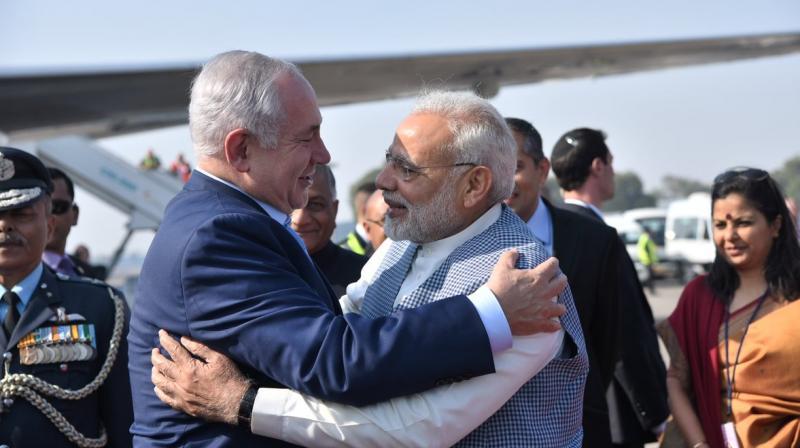At What Cost is Spike Missile Deal with Israel Back on Table, Again?

Image Courtesy: Deccan Chronicle
The saga of the Spike Anti-Tank Guided Missile (ATGM) deal between India and Israel refuses to die down. An exclusive story by The Week published last Friday reported that the Indian Army is finally procuring 240 Spike ATGM missiles and 12 launchers from Israeli public-sector defence firm, Rafael. This comes after a series of cancellations and renegotiations.
Originally, this $500 million deal was cancelled in November 2017 following a report by an expert committee, constituted by the then Defence Minister Manohar Parrikar, which found the Defence Research and Development Organisation (DRDO) capable of producing these missiles indigenously. This was followed by a much-hyped trip by Israel’s Prime Minister Benjamin Netanyahu in January 2018 at the end of which he claimed that the deal was ‘back on the table’. And yet, in December 2018, it was reported to have been cancelled again after having failed test runs in high-temperature conditions. Predictably, Netanyahu was expected to travel again to India soon after, focusing on defence deals, but the trip did not materialise.
The initial consignment of 8,000 missile heads, which was later distributed between DRDO and Rafael’s local joint venture -- Kalyani Rafael Advanced Systems -- has now been reduced to 240, and is being bought under the ‘emergency procurement’ category. The vice chiefs of all three defence services have recently been provided enhanced budgets, scaled up from Rs 100 crore to Rs 500 crore, under this category wherein procurement does not require prior approval from the Defence Acquisition Council (DAC). Defence expert D Raghunanadan notes, “I’m surprised the Army has gone for this emergency procurement despite the fact that these missiles have failed in the hot desert conditions of Rajasthan and Rann of Kutch. Clearly, there is an element of pressure after Netanyahu’s visit last year, but it still doesn’t explain Army’s expenditure on these missiles.”
India’s defence relations with Israel, while existing even under the Congress-led United Progressive Alliance regimes, have gained an unprecedented push under the current regime. India is the biggest buyer of Israeli arms, alone importing 50% of Israel’s exports. Of late, Israeli companies have opened joint ventures for defence production in India, sowing the seeds of a full-scale military industrial complex. While private firms have provided ancillary services to public sector defence manufacturing for a long time, the opening of joint venture firms in partnership with Israeli weapon companies is relatively new. Within this framework, the Spike ATGM deal has been one of the most high-profile ones, with the initial amount placed at $500 million. This deal had also led to the establishment of Kalyani Rafael Advanced Systems in Hyderabad, to provide subsystems to Spike missiles, heralding this trend of defence joint venture companies in partnership with Israel.
For the corruption-ridden Israeli defence sector, public relations (PR) is as important, if not more, as actual sales. The revolving door between Israeli armed forces and defence manufacturers is a matter of public knowledge. Corruption-related charges have been following a wide range of powerful figures, from the top brass of the armed forces to the now re-elected Prime Minister himself. India has already had a taste of this fundamental aspect of Israeli arms industry through the Barak missile scam under the previous Bharatiya Janata Party-led National Democratic Alliance regime.
Growing solidarity movements for Palestine in the form of Boycott, Divestment and Sanctions (BDS) against Israel have raised the demand for a military embargo because of the latter’s gross human rights violations and war crimes. It has also been shown that Israel uses its maiming and killing of Palestinians to sell its weapons as ‘battle tested’. Due to growing pressures of the BDS movement, which has led to cancellation of contracts and divestment from Israeli defence companies, Israel is looking towards global south for expansion opportunities and legitimacy, and in this it has found allies in authoritarian regimes from Brazil to Philippines, via India. In fact, in India, this relationship has moved on to joint trainings and security cooperation. In small measure, this alliance is based on ideological affinities of Israel and the BJP government, both riding on their exclusivist ideologies of Zionism and Hindutva, respectively.
It is in this context that the Spike missile deal is being pushed forward, at the cost of indigenous arms manufacturing and, as evident now, at the cost of the quality of the missiles themselves. To further quote Raghunanadan, “Even if the shortage of missiles and the emergency situation around them is understandable, this push does not make sense when the equipment is faulty and when the Indian missile is around is corner”. Have we reached a point where the India’s defence and security issues will be sacrificed at the altar of Israel’s PR?
While large-scale corruption and crony capitalism is not new to India’s defence sector, willfully buying faulty missiles to keep a settler colonial, occupation and apartheid regime happy is surely a new chapter in the story. It is imperative that we question this missile deal, demanding accountability from the establishment and challenging what is a clearly a corrupt deal. However, we must link this demand to the demand for military embargo on Israel, adding our voice to the global BDS movement for solidarity to Palestine. All defence deals with Israel further entrench its oppression of Palestinian people. And, therefore, solidarity groups from global south have been demanding a military embargo on Israel to end its egregious violence against Palestinians and to resist local militarisation due to dealings with Israel. By challenging the Spike ATGM deal at various levels, we will be strengthening this struggle.
The writer works for Palestine Solidarity in India.
Get the latest reports & analysis with people's perspective on Protests, movements & deep analytical videos, discussions of the current affairs in your Telegram app. Subscribe to NewsClick's Telegram channel & get Real-Time updates on stories, as they get published on our website.
























